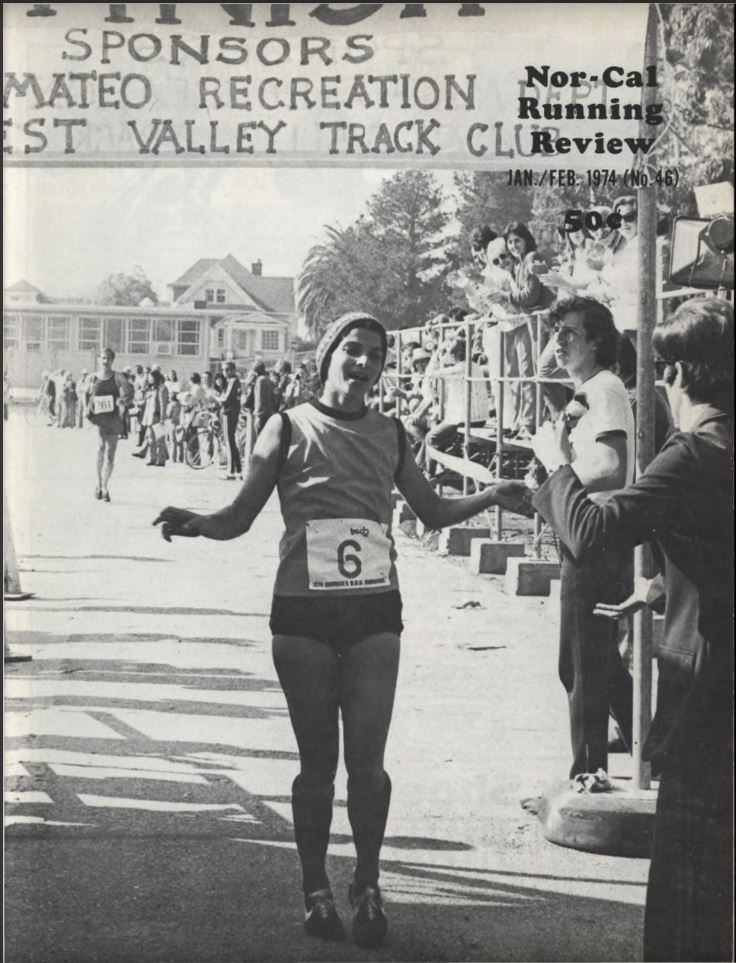Starting Line 1928 is an oral history project documenting the lived experiences of female distance running pioneers. This is the third episode of the podcast. We hope you’ll listen, and hit the “subscribe” button on your preferred podcasting app so you never miss an interview. And if you have suggestions for pioneers to profile, or want to join this effort, email us at startingline1928@gmail.com. In the meantime, thanks for listening, and being a part of this unfolding story.
For Judy Shapiro-Ikenberry, blazing a trail as an early female runner came naturally. Her parents were progressive “radicals,” in her words, and in California, where she spent most of her life, people were generally more open to women in sport than on the East Coast.
Born in Brooklyn in 1942, Judy Shapiro and her family moved to California when she was an infant in hopes the warm air would be better for her three brothers’ asthma.
It was there that 12-year-old Judy ran in her first track meet, where she and a friend from school were the only girls. She competed in every event on the track and in the field, coming in second to last in all of them. (She beat Karen, the friend who brought her along, because the girl had asthma.) Still, she thought the day was “really fun” and continued participating in track meets.
Shapiro’s mother supported her daughter’s new hobby and eventually decided she needed a coach. A friend suggested Dennis Ikenberry, a runner and student at Occidental College, who might like to help out on weekends. He started coaching the young runner — mostly urging her not to run the first lap of her 800-meter races so fast — and never stopped

In 1960, Shapiro, Ikenberry and her family piled in the car and drove to Corpus Christi, Texas, for the national track championships. While they were there, Shapiro’s mother noticed the poor conditions in the housing provided for Black athletes — former military barracks with no screens on the windows and no hot running water — and was “horrified,” the runner remembers. Her mother wrote a letter to the Amateur Athletic Union explaining her concerns, and a number of athletes and coaches signed it.
The following weekend, at the U.S. Olympic Trials for track and field in Abilene, Texas, Shapiro said the officials put everyone who had signed the letter in the same heat, to eliminate some of the critics early.
“So the next weekend, when we got to the Olympic Trials, anybody who’d signed that letter … was put into the same heats for whatever it was they were running, so they [could] eliminate all those difficult people [who were] making a mess. So the heat I was in, we had eight people, and I think five of us broke the national record,” she said.
Still, she made the final and finished fifth in 2:19.5. At age 17, she was the youngest runner in the women’s race.
In 1961, Shapiro competed in Israel at the Maccabiah Games, an international competition for Jewish athletes. She participated in five events — 800 meters, 200 meters, high jump, broad (long) jump, and javelin — and remembers it as one of the highlights of her career. But running wasn’t the only thing on her mind: “That was really fun because I was 17, and there were all these gorgeous young men athletes. … Of course, Dennis wasn’t happy with that,” she recalled.
Shapiro was injured at the time of the 1964 Olympic Trials. Instead of traveling to the meet, she married her coach, Dennis Ikenberry. Together they raised three kids, Richie, Shelly, and Becky, while staying involved in the running world throughout their lives.

She continued to train and took on longer distances while working as a teacher. She won her first marathon, the 1967 Las Vegas Marathon, in 3:40:51, just six months after Kathrine Switzer’s famous scuffle with officials at the Boston marathon. She went on to run a few more marathons and in 1974 she won the first U.S. marathon championship for women in 2:55:18. She later moved to ultrarunning and won the national 50-mile track championship in 1977.
When Judy’s athletic career started to slow in the late 1970s, the Ikenberrys started Race Central, a race timing company that helped put on some of the biggest races in the U.S. and around the world.
“I really loved yelling at volunteers,” she recalls. “That was my thing.”
The couple also ran a running store in Rialto, California, for a few years, and Dennis coached runners throughout his life.
When she talks about the barriers she faced as a female runner, Shapiro-Ikenberry mostly shrugs.
“What you could register for, you registered for and ran. And if you couldn’t register, you just sat on the sidewalk till the gun went off and then ran,” she said.
Other people worried about athletics would make women infertile or tried to stop them from competing, but the busy runner didn’t have much time to get involved in politics.
“I was raising kids. I was teaching. I was active in the local community,” she said. “I didn’t worry about other concerns so much.”
Besides, it was always officials who gave women a hard time, not the male competitors.
“They didn’t like it when we beat them, but they were very accepting and very encouraging,” she remembered. “It was always the officials that were the problem, you know, and it’s just two different classes of people. And they get their kicks from enforcing the rules. We got our kicks from being in shape.”
Note about the author: Laura Fay is a journalist and runner.

